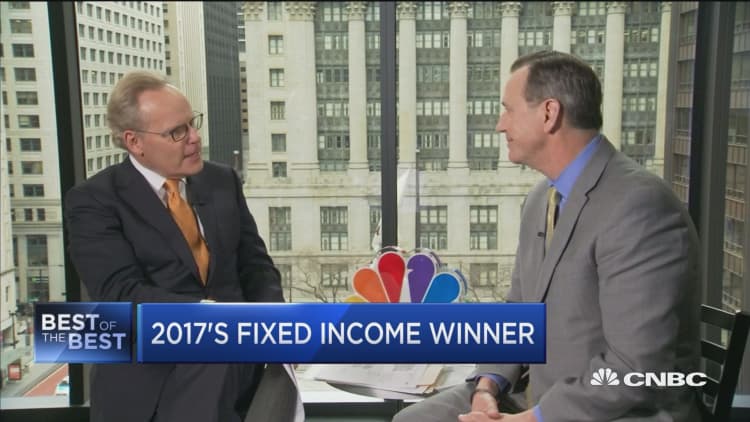
Morningstar announced its top fund managers on Wednesday.
The winners were chosen for their funds' outperformance in 2017, and those managers are now looking to replicate that success in 2018.
Here are the victors, the secrets to their success and what they are expecting this year.
Domestic stock fund manager of the year
Steven Wymer — Fidelity Growth Company
The Fidelity Growth Company grew 36.8 percent last year, with its stakes in tech and biotech helping boost results.
"We put together this portfolio over a lot of years. We found some good stocks, and we stuck through them through some tough times and figured out which ones were going to carry the water for us over the years," the fund's portfolio manager, Steven Wymer, said in an interview with "Power Lunch" on Wednesday.
For example, Wymer bought Nvidia back in 2008. The stock rallied 82 percent in 2017.
In addition to Nvidia, the fund's top holdings include Apple, Amazon, Alphabet and Facebook.
While the market has had a good runup, Wymer still sees opportunities for growth names this year.
"The opportunities should broaden out quite a bit. Not only is the U.S. economy accelerating, but the international economy is a tailwind to the market. Along with the weaker dollar, we're seeing some favorable business results translate back into U.S. earnings," he said.
International stock fund manager of the year
Sarah Ketterer, Harry Hartford and team — Causeway International Value
Morningstar called Causeway International Value's stock selection "quite solid," particularly in the eurozone and in South Korea. The fund saw a 27.1 percent return in 2017.
To find value, the fund's managers look for companies that are in operational distress but not financial distress. For example, the fund built a big stake in Volkswagen during the emissions scandal. The automaker was up more than 40 percent last year.
The fund also has a relatively low turnover portfolio of 50 to 60 names.
"Concentration means more bang for the buck. So when we have a big weight in Samsung Electronics it really makes a difference," said Sarah Ketterer, Causeway's CEO and co-founder.
"If you have small weights that means you've got this proliferation of stocks and you've diluted your great ideas," she told "Power Lunch."

Fixed-income fund manager of the year
Michael Collins, Robert Tipp, Richard Piccirillo and Gregory Peters — Prudential Total Return Bond
The Prudential Total Return Bond gained 6.6 percent in 2017.
"In fixed income it's really about not losing money. Avoiding the downside in bonds, avoiding the downside in sectors really leads to that consistent performance over the long term," the fund's co-manager, Michael Collins, told "Power Lunch."
He said the team thinks there aren't enough rate hikes priced into the fixed-income market and therefore he likes the long end of the yield curve, or longer duration bonds.
The team also plans to continue to aggressively rotate the portfolio.
"What we're doing is reducing exposure to more cyclical industrial corporate credit risk around the globe — high yield bonds, bank loans, investment-grade corporate bonds," said Collins.
"We're rotating into very high-quality, mostly senior positions — triple-A rated positions — in structured products, in commercial mortgage-backed securities, collateralized loan obligations, etc."
Allocation fund manager of the year
David Giroux, T. Rowe Price Capital Appreciation
Giroux said the T. Rowe Price Capital Appreciation fund, which gained 15.38 percent last year, has a lower risk these days compared with the last three to four years.
"Valuations are high. We're sort of eight to nine years into a bull market and economic recovery. The combination of those factors and sort of strong investor euphoria today does not necessarily foreshadow great returns over the next three to four years," he said in an interview with "Power Lunch."
Last year, health-care stocks worked well for the fund, Giroux said.
While he still holds moderated positions in those stocks, this year he sees opportunity in utilities.
He's also reducing risk on the fixed-income side, reducing exposure to high-yield and adding Treasurys and some corporate bonds.
— CNBC's Karen Stern contributed to this report.



